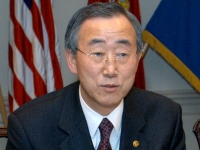Politics
Ban to meet with UN Security Council powers over Syria crisis
USPA News -
United Nations (UN) Secretary-General Ban Ki-moon will meet with ambassadors from China, France, Russia, the United Kingdom, and the United States on Friday after cutting short a visit to Europe over the escalating crisis in Syria where the government has been accused of using chemical weapons. UN spokesman Martin Nesirky said Ban returned to UN headquarters in New York City on Thursday evening after cutting short his visit to Europe.
"He intends to engage with Member States on developments in Syria, starting today at noon (local time) with a meeting with the Permanent Members of the Security Council," he said. Friday`s meeting comes as a UN fact-finding mission to investigate allegations that chemical weapons have been used during the ongoing conflict arrived at a military hospital in a government-held area of the capital Damascus. They were due to meet with government soldiers who reportedly fell ill last week after being exposed to `poison gas` in a tunnel near Damascus, apparently after it had been used by rebels. Ban cut short his official visit to Austria in preparation for a briefing from the UN inspectors, who are led by Swedish scientist Ake Sellstrom. The team is expected to wrap up its work by Friday evening, leave Syria by Saturday morning, and brief the UN head as soon as possible after departing the country. The mission arrived in Syria earlier this month to investigate previous allegations of chemical weapons use during the country`s ongoing civil war, but they went to the Ghouta area of eastern Damascus earlier this week after a suspected chemical strike there is claimed to have killed hundreds of people. Lakhdar Brahimi, the joint United Nations-Arab League Envoy for Syria, said Wednesday that it appeared "some kind of substance" was used in the Ghouta attack that took place earlier this month. He stopped short of saying chemical weapons were used in the attack, but some countries such as the United States have blamed the regime of Syrian President Bashar al-Assad. On late Thursday, British lawmakers rejected a proposal that would have paved the way for military action in Syria, marking a stunning defeat for Prime Minister David Cameron whose government had been expected to join the U.S. in possible airstrikes against Assad`s regime. The government`s nonbinding motion was defeated by 285 to 272, a majority of just 13 votes. The military action would have been in response to the alleged use of chemical weapons by Assad, but countries including the United States and France are still considering their options for a strike on Syria. Cameron, speaking in the House of Commons after Thursday`s vote, assured lawmakers that the United Kingdom would not take part in any military action against Syria unless another vote takes place. "I can give that assurance," he said, responding to a question from Opposition leader Ed Miliband. "I strongly believe in the need for a tough response to the use of chemical weapons, but I also believe in respecting the will of this House of Commons," the prime minister told lawmakers. "It is very clear tonight that, while the House has not passed a motion, the British Parliament, reflecting the views of the British people, does not want to see British military action. I get that, and the Government will act accordingly." Earlier on Thursday, the British government published a summary of its legal advice on a possible military strike on Syria. It said such military action would be considered to be a "humanitarian intervention," of which the aim would be to relieve humanitarian suffering by deterring or disrupting the further use of chemical weapons. "If action in the [UN] Security Council is blocked, the UK would still be permitted under international law to take exceptional measures in order to alleviate the scale of the overwhelming humanitarian catastrophe in Syria by deterring and disrupting the further use of chemical weapons by the Syrian regime," the government`s document said.
Liability for this article lies with the author, who also holds the copyright. Editorial content from USPA may be quoted on other websites as long as the quote comprises no more than 5% of the entire text, is marked as such and the source is named (via hyperlink).






